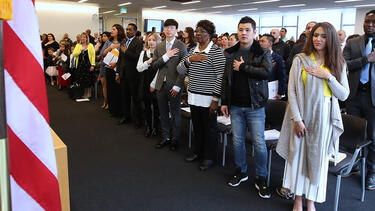Politics and Policy
Are We Witnessing the Implosion of the World’s Richest Man?
Elon Musk has less leverage in his battle with Donald Trump than he thinks, Yale SOM leadership expert Jeffrey Sonnenfeld and co-author Steven Tian write. But neither of the former allies can come away from this feud with a win.

To Stop Violent Policing, Build Effective Police Organizations
For the last three years, Yale SOM's Rodrigo Canales has led a project studying police forces in Mexico and testing approaches to building more effective and trusted departments.

Don’t Use COVID-19 as an Excuse to Turn Away Skilled Immigrants
The Trump administration is reportedly planning to limit immigration for skilled workers in order to boost employment for domestic workers. Yale SOM’s Jeffrey Sonnenfeld writes that such a move would stifle innovation and even endanger Americans’ health.

Faculty Viewpoints: A Global View
In an online conversation, Yale SOM faculty members discussed diverging responses to the COVID-19 pandemic and the need for global cooperation.

What Is the Impact of Trump’s Immigration Order?
We asked Cristina Rodríguez of Yale Law School, whose research interests include immigration law and policy, to explain the consequences of President Donald Trump's April 22 proclamation on immigration during the COVID-19 crisis.

What’s Next in the Fight against COVID-19?
Experts from schools in the Global Network for Advanced Management discussed what we have learned over the first weeks of the pandemic and what it tells us about what comes next.

Faculty Viewpoints: The Public Health Response
In an online discussion, Yale faculty members discussed what’s missing from the public health response to COVID-19 and offered visions of the post-pandemic world.

Keeping a Close Eye on Local Governments’ Finances Can Improve How they Govern
Yale SOM’s Anya Nakhmurina found that fiscal monitoring policies, which require a state office to review local governments’ finances, boosted municipalities’ financial health and reduced corruption convictions of local officials.

Can Big Data Fight a Pandemic?
The COVID-19 crisis has intensified the debate over big data and privacy. Governments are pulling together data from public and private systems in order to predict and counter the spread of COVID-19. But setting aside privacy protections in a time of crisis could lead to new, permanent norms.

What Happens When a Billion Identities Are Digitized?
The success of India’s Aadhaar, a biometrically secured national identification system, has ignited a debate over whether any entity, public or private, should have the ability to pool our full digital profiles.

A Global Crisis Requires Global Collaboration
On March 24, experts in finance, economics, and health from Global Network schools in seven countries gathered for an online conversation about the state of the COVID-19 pandemic, the economic fallout, and the path to recovery.
